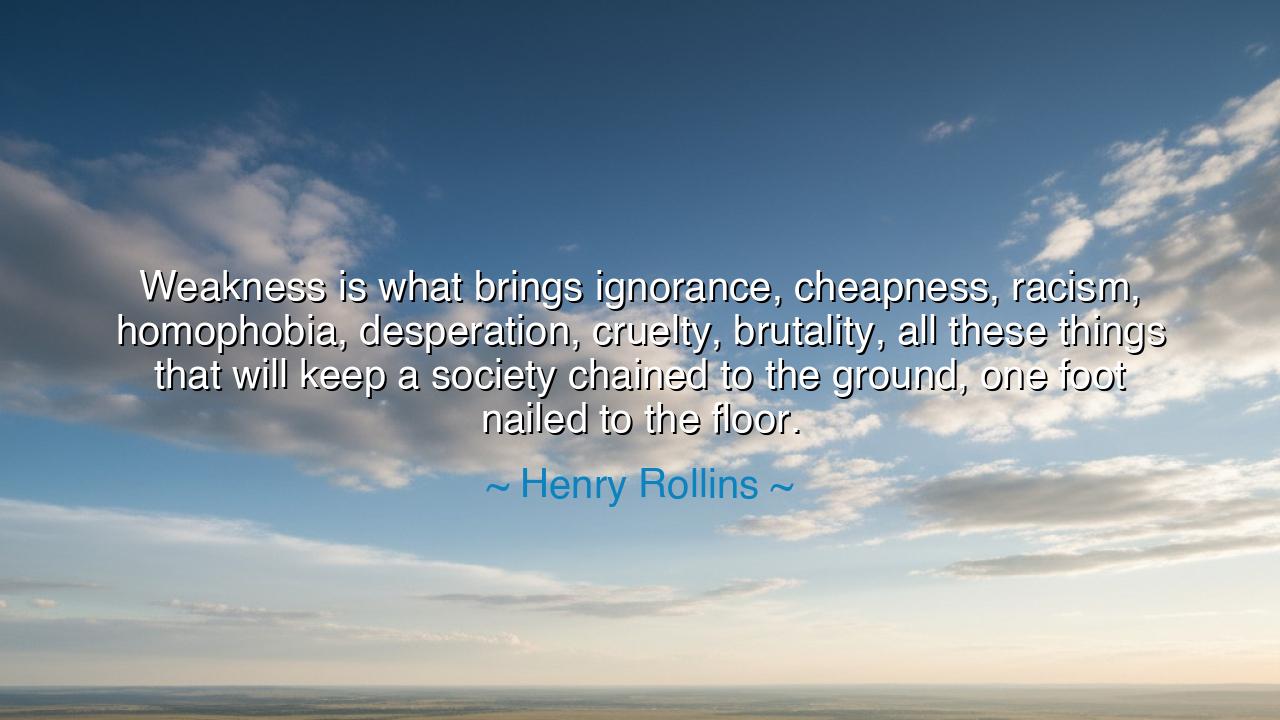
Weakness is what brings ignorance, cheapness, racism, homophobia
Weakness is what brings ignorance, cheapness, racism, homophobia, desperation, cruelty, brutality, all these things that will keep a society chained to the ground, one foot nailed to the floor.






Hear the fiery words of Henry Rollins, a man who has lived with intensity and spoken with the edge of truth: “Weakness is what brings ignorance, cheapness, racism, homophobia, desperation, cruelty, brutality, all these things that will keep a society chained to the ground, one foot nailed to the floor.” These words are not spoken in calm reflection but in the thunder of a battle cry, warning that the decay of nations is not born from strength misused, but from weakness of spirit, mind, and courage. He declares that the vices which drag down civilization do not come from the noble struggle of humanity, but from the failure to rise above fear, insecurity, and the smallness of heart.
The meaning of this is profound. True strength is not violence, not domination, not the silencing of others. True strength is knowledge, compassion, courage, and resilience. When these are absent—when there is weakness—then evil rushes in to fill the void. Ignorance festers where curiosity is silenced. Racism thrives where fear overpowers understanding. Cruelty takes root when empathy is cast aside. Thus, Rollins reveals that the gravest dangers of civilization are not external enemies, but the internal frailties that prevent a people from lifting themselves upward.
History gives us many examples. Consider Germany after the First World War. Defeated, humiliated, desperate, and weakened by economic collapse, its people were vulnerable to false promises. Into this weakness stepped the brutality of fascism. Racism, cruelty, and ignorance were raised as banners, and the world was plunged into darkness. The chains that held that society to the ground were forged not by strength, but by despair, fear, and moral collapse. Had the people found the courage to resist hatred, had they cultivated resilience instead of surrendering to weakness, history might have taken a different path.
But strength can transform a people, even in suffering. Consider South Africa at the end of apartheid. Here was a land drowning in racism and brutality, with decades of oppression behind it. Yet Nelson Mandela and others called for strength, not revenge. They turned their backs on the weakness of hatred and chose the strength of reconciliation. By doing so, they shattered the chains that held their society nailed to the ground. Their lesson is clear: where weakness breeds destruction, strength rooted in justice lifts nations toward the sky.
Rollins’ imagery of a foot nailed to the floor is striking. It speaks of a people trapped in endless circles, repeating the same errors, bound by their own failures. A nation chained by ignorance and cruelty may move, but only in a circle, never advancing, always returning to the same conflicts, the same divisions, the same wounds. Only by tearing the nail free—by confronting weakness with knowledge, compassion, and courage—can a society truly progress.
The lesson for us is both personal and collective. In our own lives, every act of hatred, every indulgence in prejudice, every surrender to cruelty is a sign of weakness. We must seek to build strength—not only in body, but in mind and in character. As communities, we must nurture resilience, uplift the vulnerable, and challenge ignorance wherever it rises. For only then can we avoid the chains Rollins warns against.
What, then, must we do? Strengthen ourselves through education, reflection, and empathy. Strengthen our society by refusing to tolerate the poisons of racism, homophobia, and cruelty. Stand firm against brutality, not by answering it with more brutality, but by embodying the higher strength of justice and compassion. Teach children that to be strong is to be kind, to be wise, to be brave. And above all, remember that weakness is not destiny—it is a choice.
Thus remember: the fall of civilizations begins not with invading armies, but with the weakness that breeds hatred and chains a people to despair. The rise of civilizations begins when individuals and nations tear free from those chains and stand in true strength. Henry Rollins’ words are not just warning, but challenge: build strength of spirit, and no chain can hold you down.






AAdministratorAdministrator
Welcome, honored guests. Please leave a comment, we will respond soon